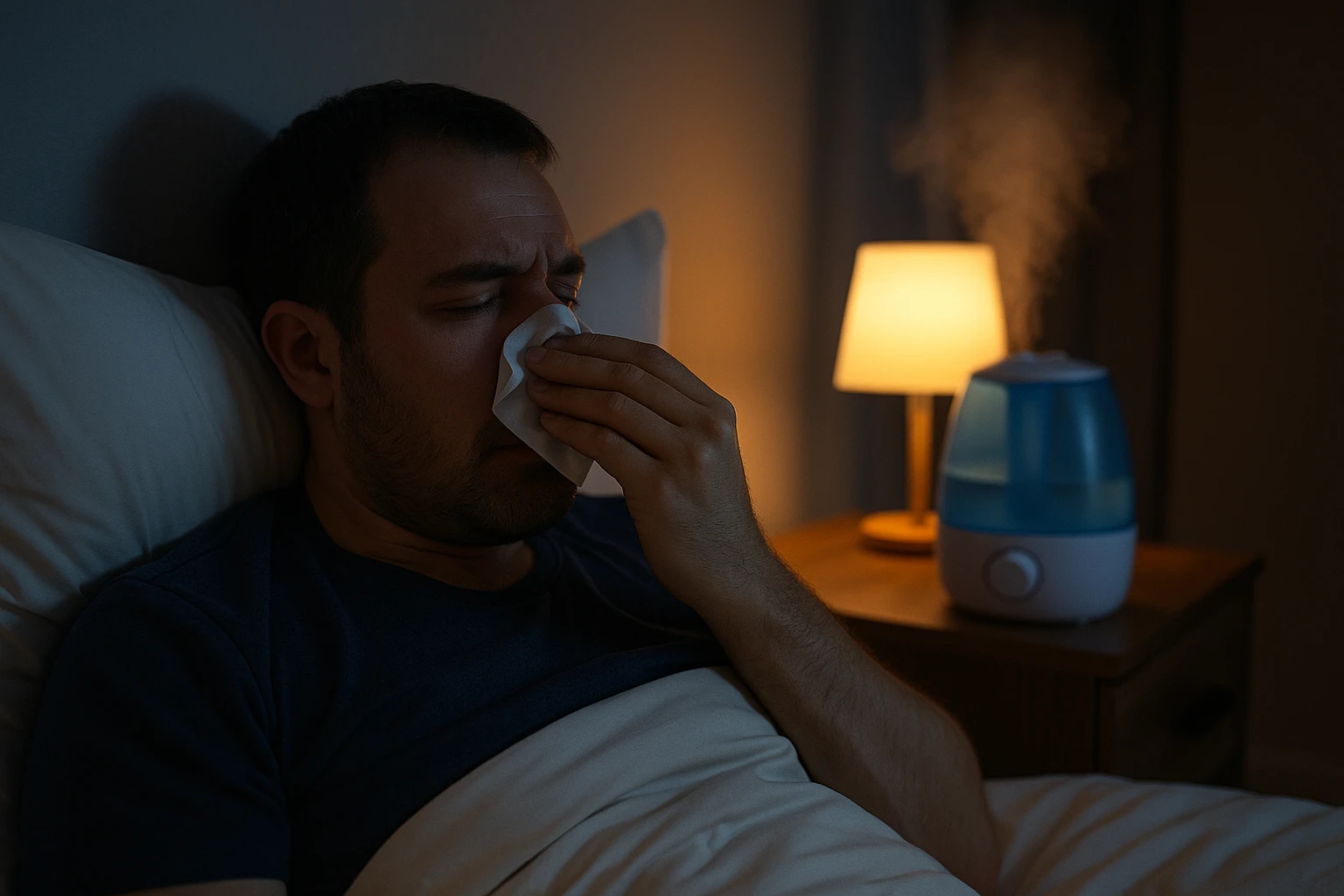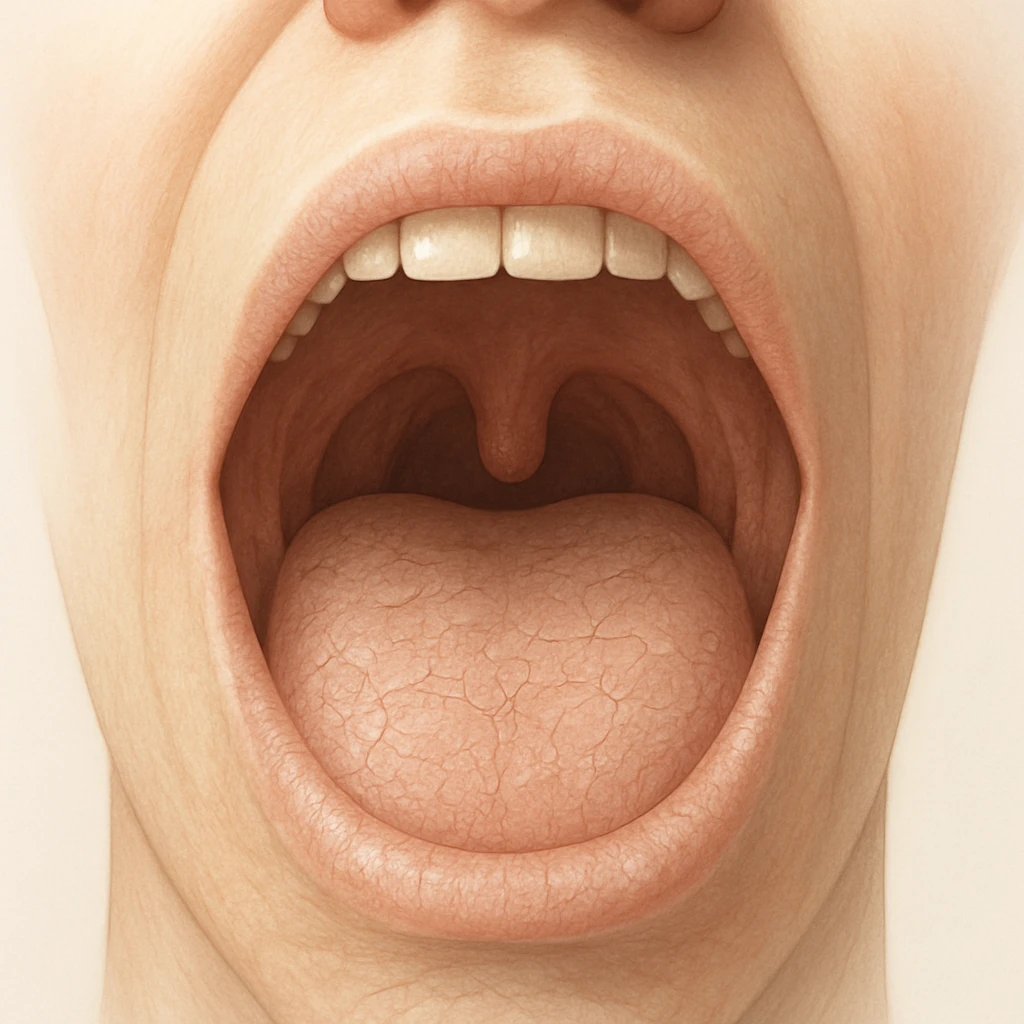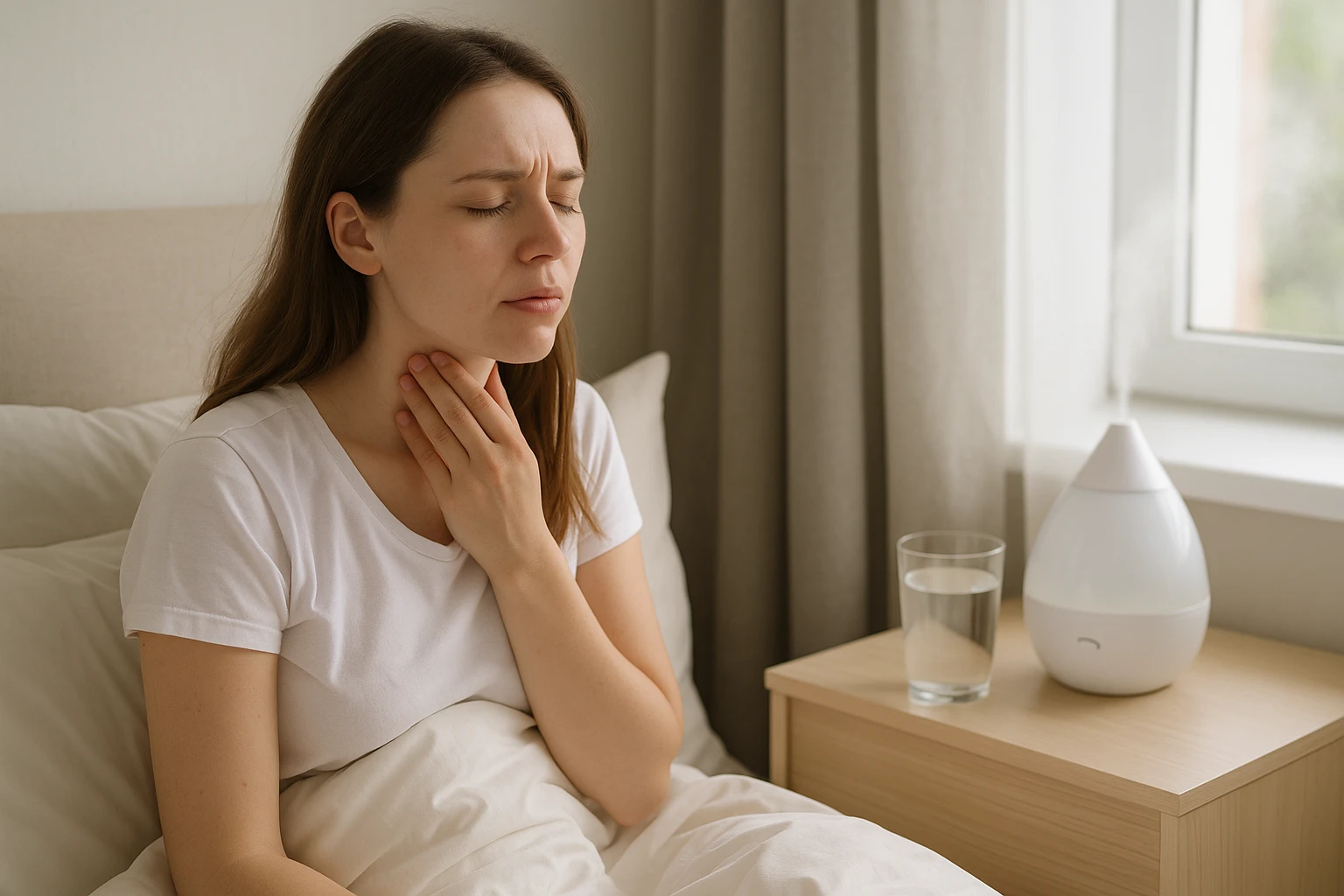Why Your Nose Gets Stuffy at Night and How to Breathe Easier
Why a Stuffy Nose Feels Worse at Night
A stuffy nose at night can make it difficult to fall asleep, breathe comfortably, and feel rested in the morning. Congestion often worsens when lying down because blood flow to the nasal passages increases and mucus drainage slows. Common triggers include allergies to dust mites, pet dander, or mold, as well as dry indoor air, colds, and irritants like smoke. In some cases, hormonal changes, overuse of nasal sprays, or structural nasal problems can contribute. Understanding why nasal congestion becomes more noticeable at night helps identify practical ways to improve breathing and sleep quality. Persistent symptoms, however, should be checked by a healthcare professional.
Causes of a Stuffy Nose at Night
Nasal congestion often feels worse after lying down because posture affects blood and mucus flow. Reclining increases blood flow to the upper body and causes nasal tissues to swell, while gravity no longer helps mucus drain toward the throat. These changes create a blocked feeling that makes breathing more difficult.
Main Causes of Nighttime Nasal Congestion
- Allergies and irritants: Dust mites, pet dander, mold spores, or pollen can inflame nasal tissues and narrow airways, especially in the bedroom environment.
- Dry indoor air: Low humidity dries and irritates nasal passages, prompting excess mucus production.
- Respiratory infections: Colds or flu can cause lingering inflammation and mucus buildup that worsen at night.
- Hormonal or medication effects: Pregnancy-related hormonal changes and rebound congestion from overused nasal sprays can lead to swelling and blockage.
- Structural issues: A deviated septum or nasal polyps can restrict airflow, making congestion more persistent.
Addressing these factors-such as reducing allergens, maintaining proper humidity, and seeking evaluation for structural issues-can significantly improve nighttime comfort and sleep quality.
How Nighttime Congestion Affects Sleep
When the nose becomes congested, airflow through the nasal passages is reduced, making breathing less efficient. This problem worsens at night as lying flat allows blood and mucus to accumulate in nasal tissues. As a result, many people switch to mouth breathing during sleep, which can affect rest and comfort.
Impact on Sleep Quality
- Mouth breathing: Bypasses the nose’s natural filtration and humidification, leading to dryness and irritation.
- Morning discomfort: A dry mouth or sore throat often follows a night of mouth breathing.
- Interrupted sleep: Frequent awakenings to clear the nose or change position prevent deep, restorative rest.
- Next-day fatigue: Poor sleep quality can result in grogginess and reduced energy the following day.
Managing congestion before bedtime can improve airflow, reduce sleep interruptions, and promote better overall rest.
Diagnosing Persistent Nighttime Nasal Congestion
When nasal congestion lasts for weeks or interferes with daily life, it’s important to determine the underlying cause. Physicians usually begin by asking about symptom patterns-whether the stuffiness occurs mainly at night, during certain seasons, or after exposure to potential triggers. Allergies to dust mites, pet dander, mold, or pollen are frequent causes of nighttime blockage.
How Doctors Identify the Cause
- Medical history: Evaluating symptom timing, severity, and possible allergen or irritant exposure.
- Physical examination: Checking for swelling, nasal discharge, or structural problems such as a deviated septum or nasal polyps.
- Allergy testing: Identifying specific triggers to guide personalized treatment.
- Medication review: Assessing for rebound congestion from overused nasal sprays or other drugs.
When to Seek Medical Advice
While mild congestion is common, professional care is needed if you experience:
- Persistent or worsening stuffiness lasting more than a few weeks
- One-sided nasal blockage
- Facial pain, pressure, or swelling
- Fever or other signs of infection
Recognizing these warning signs early ensures timely diagnosis and appropriate treatment, improving breathing comfort and sleep quality.
Home Remedies for a Stuffy Nose at Night
Simple, consistent home strategies can make a big difference for those struggling with a stuffy nose at night. The following steps can help ease breathing and improve sleep comfort.
Effective Home Remedies
- Adjust sleep position: Elevate the head with an extra pillow or slightly raise the head of the bed to help mucus drain and reduce nasal pressure.
- Add humidity: Use a humidifier or take a warm shower before bed to moisten the air. Steam inhalation and saline nasal rinses help clear mucus and soothe nasal passages.
- Control allergens: Wash bedding weekly in hot water, vacuum regularly, and keep pets out of the bedroom to limit exposure to dust mites and dander.
- Avoid irritants: Minimize exposure to smoke, strong odors, and harsh cleaning products that can inflame nasal tissues.
- Stay hydrated: Drink plenty of fluids to keep mucus thin and flowing freely. Nasal adhesive strips can also provide gentle mechanical relief by opening nasal passages.
Combining these approaches-such as adjusting sleep position, maintaining humidity, managing allergens, and staying hydrated-can relieve nighttime congestion and promote more restful sleep without relying solely on medication.
Medical Treatment and When to See a Doctor
If home remedies do not provide enough relief from nighttime nasal congestion, medical treatment may be needed. Persistent or severe symptoms can result from underlying inflammation, allergies, or structural nasal issues. Healthcare professionals can recommend appropriate medications or therapies to reduce swelling, improve airflow, and address the root cause.
Common Medical Treatments
- Saline sprays or rinses: Moisturize the nasal passages and safely clear mucus without dependency.
- Decongestant sprays: Provide short-term relief but should only be used for a few days to avoid rebound congestion.
- Prescription therapies: For chronic or severe congestion, clinicians may prescribe targeted medication or assess structural nasal conditions.
Special Considerations
Pregnancy: Hormonal changes can increase nasal swelling and blockage. Safe management includes using a humidifier, performing saline rinses, and staying well-hydrated rather than taking medication.
Children: Nighttime congestion in children often results from colds, allergies, or dry air. Gentle care such as saline sprays, nasal suction, and maintaining a clean environment can ease breathing. Avoid medicated sprays or strong decongestants unless recommended by a healthcare provider.
Recognizing when to seek medical guidance ensures effective, safe treatment tailored to the individual’s age, health, and the underlying cause of congestion.
Frequently Asked Questions About a Stuffy Nose at Night
Why does my nose only feel blocked when I lie down?
Lying flat increases blood flow to the nasal passages and slows mucus drainage, which can make your nose feel more congested at night. Elevating your head slightly while sleeping can help reduce this effect.
Can allergies cause a stuffy nose at night even if I feel fine during the day?
Yes. Allergens like dust mites, pet dander, or mold often build up in bedding or bedroom fabrics, triggering nighttime congestion. Regular cleaning and using allergen-proof covers can help.
What are safe ways to relieve a stuffy nose before bed?
Using a humidifier, taking a warm shower, or performing a saline rinse can loosen mucus and ease breathing. Staying hydrated and avoiding irritants like smoke or strong scents also helps.
When should I see a doctor for nighttime nasal congestion?
If your stuffy nose lasts more than a few weeks, affects only one side, or is accompanied by facial pain or fever, it’s best to seek medical advice. These could signal infection or structural problems.
Is it normal to have a stuffy nose during pregnancy?
Yes. Hormonal changes can cause nasal swelling and congestion, especially at night. Non-medicated treatments like humidification and saline rinses are safe ways to improve comfort during pregnancy.
How can I help my child sleep better with a stuffy nose?
Keep the air moist with a humidifier, use saline sprays or gentle suction to clear mucus, and reduce dust or pet dander in their room. Avoid decongestant sprays unless advised by a doctor.
Can chronic nighttime congestion affect my sleep quality long term?
Yes. Ongoing congestion can lead to mouth breathing, dry throat, and poor sleep quality. Managing underlying causes and maintaining nasal hygiene can help restore restful, uninterrupted sleep.













